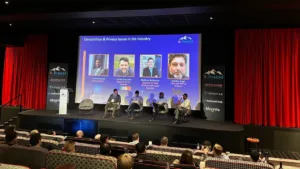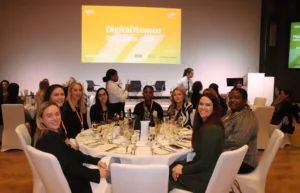Simona has worked within media, data and tech agencies and brings a well-rounded view on the impact of data and technology across the ecosystem. She has supported and leading many successful international client teams driving their digital transformation journey and helping their business growth. Currently she is VP Global Clients Solutions at Kinesso (part of IPG), where she creates bespoke Data & Tech strategies and solutions for our clients. Her work covers Identity, Data, Audience, Content and Media campaign automation – areas she knows well from over 14 years in data-driven marketing.
What is the biggest opportunity for women in your sector of the digital industry today?
The Women in the Workplace report from McKinsey revealed that we’re amid a “Great Breakup.” Women are demanding more from work, and they’re leaving their companies to get it. Women leaders are switching jobs at the highest rates we’ve ever seen—and at higher rates than men in leadership. To put the scale of the problem in perspective: for every woman at the director level who gets promoted to the next level, two women directors are choosing to leave their company. That could have serious implications for companies. It’s increasingly important to women leaders to work for companies that prioritise flexibility, employee well-being, and diversity, equity, and inclusion (DE&I). Young women are even more ambitious and place a higher premium on working in an equitable, supportive, and inclusive workplace, and they’re prepared to fight for it. In this unprecedented scenario, only companies that truly support and implement DE&I in every single part of their business and organisation, can overcome this problem and fight these unconscious biases.
What are some of the challenges that you see for women in the industry? Any advice as to how to overcome it?
Women are already significantly underrepresented in leadership. For the eighth consecutive year of the Women in the Workplace report, a broken rung at the first step up to manager is holding women back. For every 100 men who are promoted from entry-level roles to manager positions, only 87 women are promoted, and only 82 women of colour are promoted. As a result, men significantly outnumber women at the manager level, and women can never catch up. There are simply fewer women to promote to senior leadership positions.
We’re more likely to experience microaggressions, such as having our judgment questioned or being mistaken for someone more junior, and we feel unfairly unrewarded.
Many women experience bias not only for their gender but also because of their race, sexual orientation, disability, or other aspects of their identity—and the compounded discrimination can be much greater than the sum of its parts. As a result, these groups of women often experience more microaggressions and face more barriers to advancement.
As a woman leader, the best advice I feel to give to other women in our industry is to start by choosing companies that focus on getting more women into leadership and retaining the women leaders they already have (this information is usually easy to find online when studying the company). These companies are going further. They usually sponsor trainings, offer benefits to improve women’s day-to-day work experience. Second advise would be to proactively participate to women networks, events, and seminars. It’s a great way to keep yourself updated, motivated and feel inspired by other successful women’s stories. But above all, never feel alone! We as women in this industry, including myself, have all experience frustrations, embarrassment, and disappointment, and we even doubted ourselves because of misogynist comments or environment. We should all feel empowered to open up about all of this. Talk to your friends, network, or colleagues, even better if you have a good manager invested in people management and DE&I. They will support your career development and well-being.
What three things could employers at companies do to make the industry better for women?
- Attack unconscious biases. Many big companies have mandatory trainings, voluntary seminars, and events, but it’s important to push them with more urgency everywhere. Recognising unconscious biases is very hard, so businesses need strong leaders that can deal with them accordingly and be accountable.
- Shared Parental leave. If biases are hard to fight and require time and education, parental leave should be the easiest and most effective way to guarantee a better, equal, and non-discriminated workplace for women. This measure has another positive effect: empowering DE&I.
- These 2 points bring me to the third one: Inclusive workplace. Businesses should create a comfortable, reassuring working environment for women (and all the minorities), parents or not.
What is the biggest misconception about women and by women in the digital industry?
A dangerous misconception in our industry suggests that women in leadership positions do not support other women in their team, contributing to gender inequality. Nothing further from the truth. Research speaks for itself: when one woman reaches a senior role, the person blocking the woman’s path is a male Chief Executive. And when women join the board, there’s a better chance that other women will rise to top executive positions (“The Myth of the Catty Woman”, The New York Times). Another report states that, compared to men, women leaders do more to foster DE&I (“Women in the Workplace”, McKinsey). Women create opportunities for women. Let’s dig, instead, into why there are much fewer women than men at C-level positions, and change the course of our history, especially for the younger generations.









